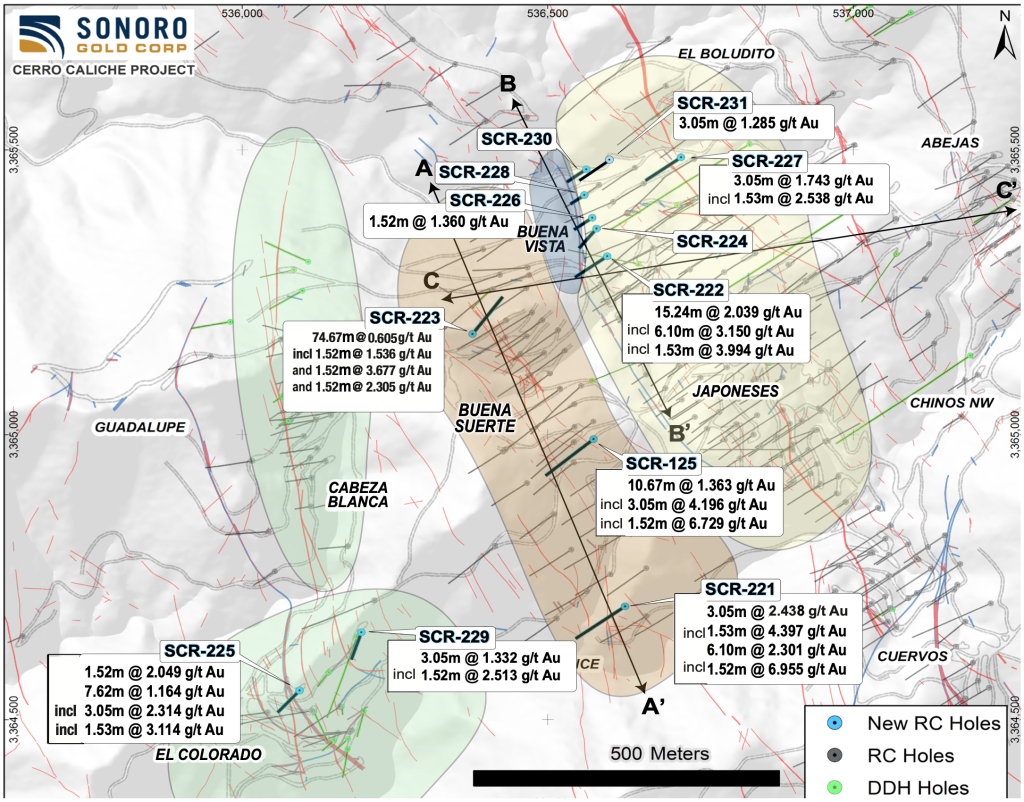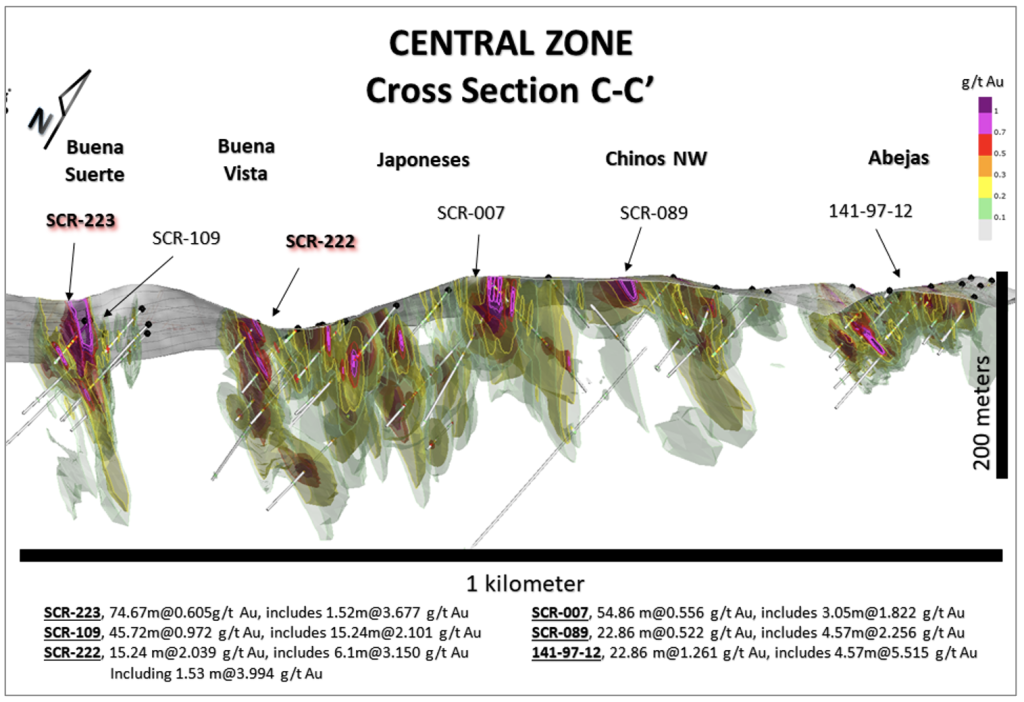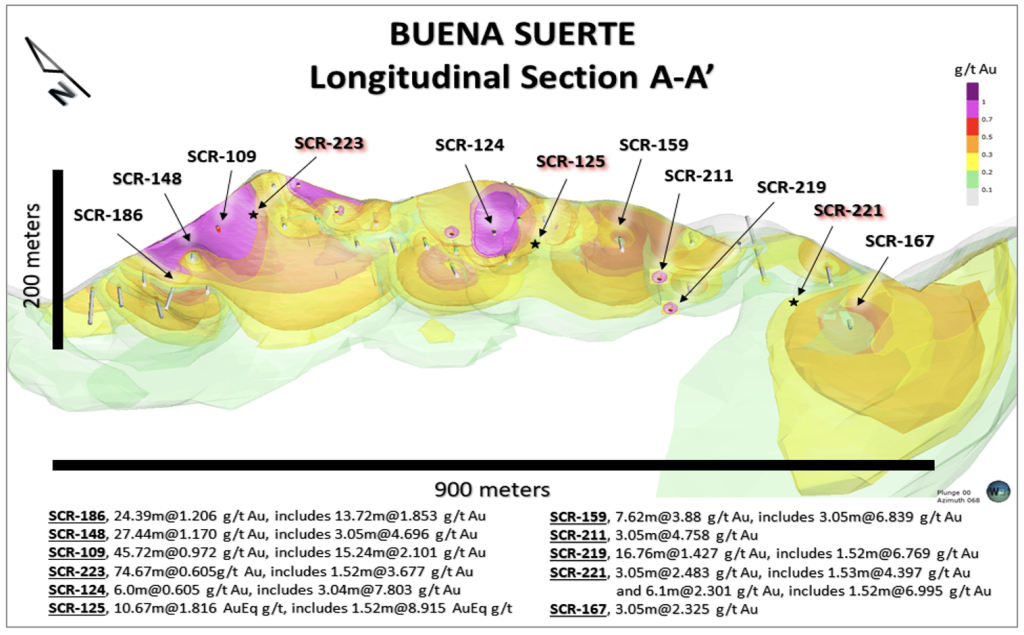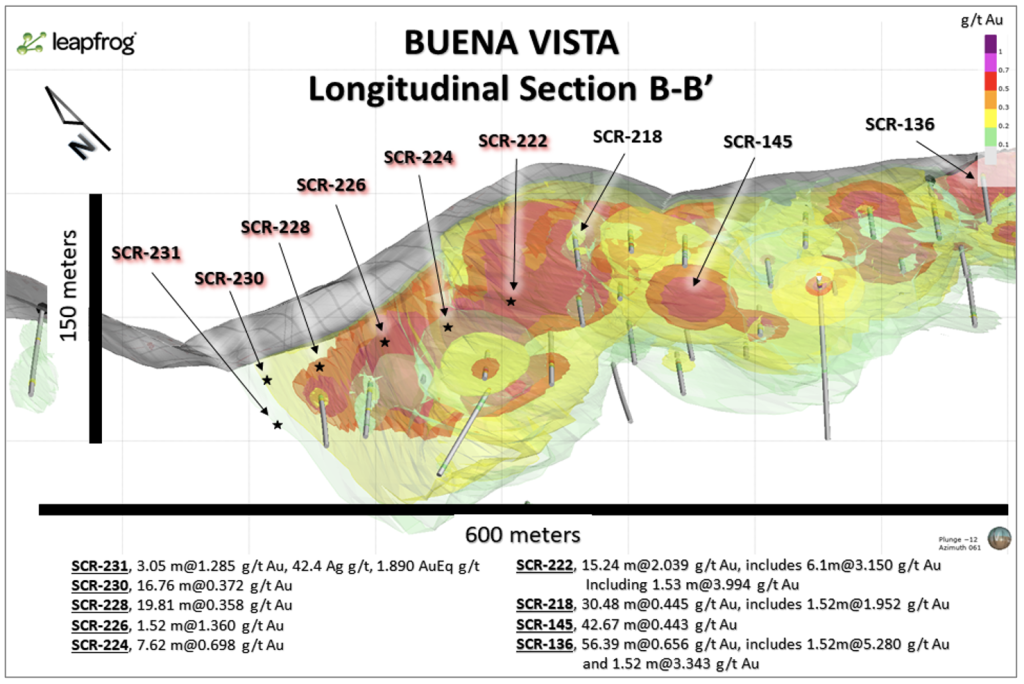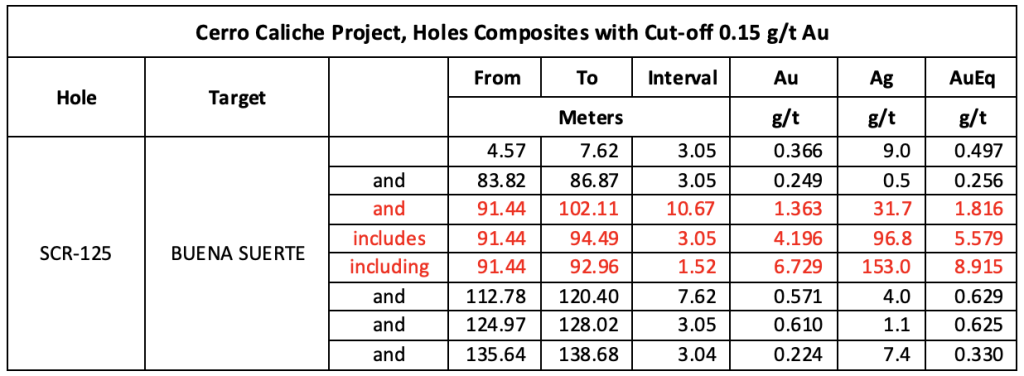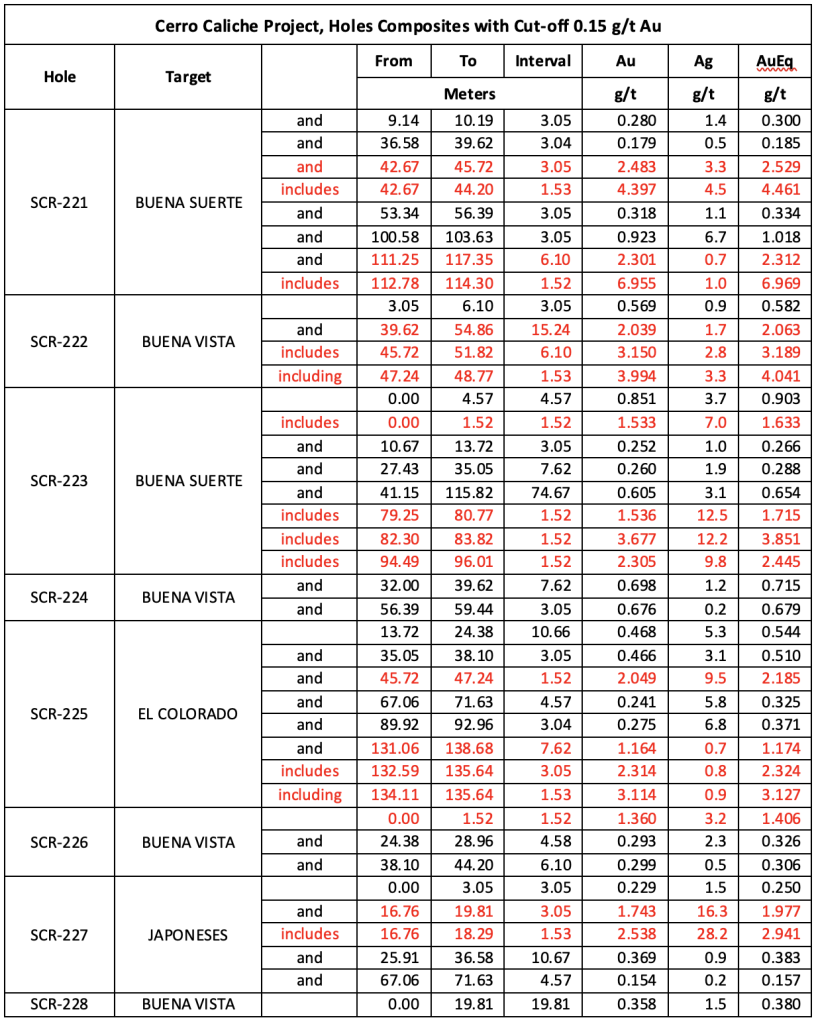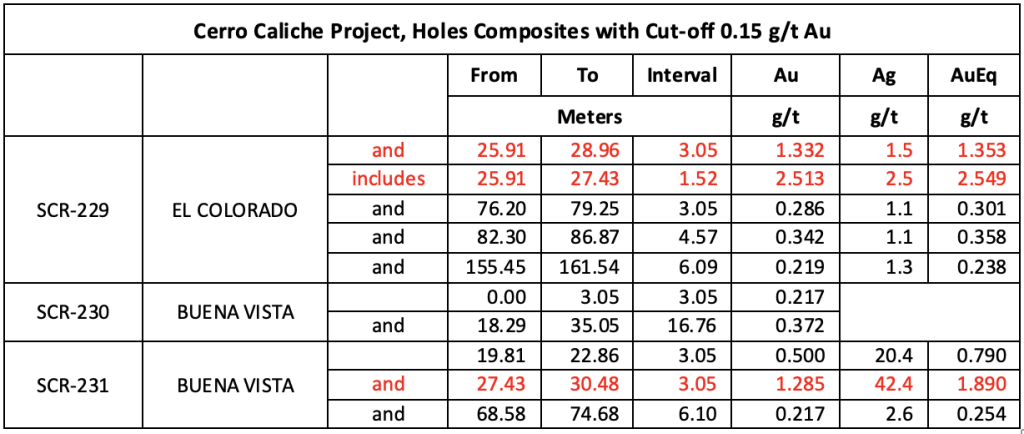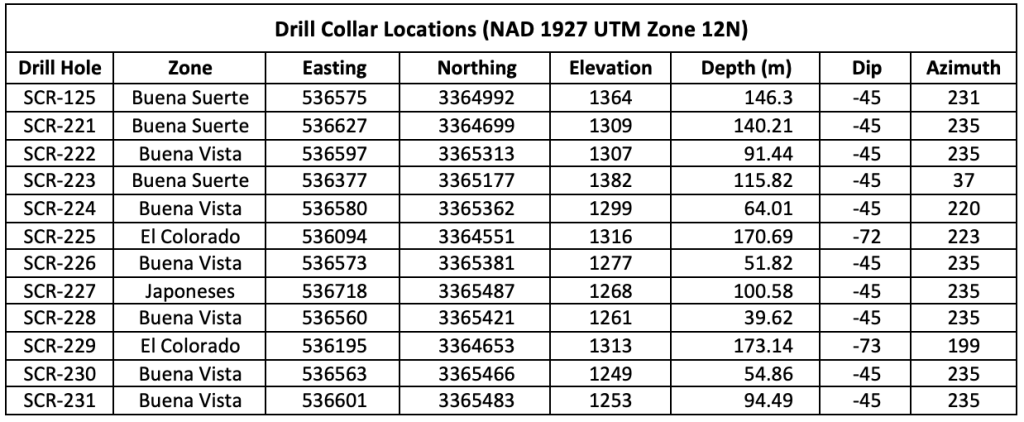Latest Drill results increase the potential for a single pit for three large zones of shallow oxide gold mineralization
VANCOUVER, Canada, April 5, 2021 – Sonoro Gold Corp. (TSXV: SGO | OTCQB: SMOFF | FRA: 23SP) (“Sonoro” or the “Company”) is pleased to report assay results from an additional 12 RC drill holes completed at its Cerro Caliche gold project in Sonora, Mexico. Results reflect strategic drilling recently concluded at the Buena Suerte gold mineralized zone as well as at the adjacent Buena Vista extension of the Japoneses zone. One additional drill hole was completed at the northern extension of the Japoneses zone, and another two drill holes were completed at the El Colorado gold mineralized zone.
The map below shows the location of the 12 RC drill holes as well as the proximity between the Buena Suerte and Japoneses gold mineralized zones.
This very successful drilling program will be temporarily concluded this month, following the completion of the current phase of approximately 34,000 meters of drilling. The program was expanded and extended for the purpose of increasing the potential resource in the new NI 43-101 Technical Report and Preliminary Economic Assessment (PEA) to conceptually support a materially larger Heap leach Mining Operation (HLMO) than originally intended. Drilling is scheduled to resume following receipt of the 43-101 Technical Report and the PEA, in conjunction with receipt of project financing.
Highlights are as follows:
- Drill hole SCR-223 in the north western extension of Buena Suerte intercepted 74.67 meters averaging 0.605 g/t Au including three intervals of 1.52 meters averaging up to 3.677 g/t Au.
- Drill hole SCR-222 in the Buena Vista northwest extension of Japoneses intercepted 15.24 meters averaging 2.039 g/t Au including 6.1 meters averaging3.150 g/t Au.
- Drill hole SCR-227 in the northern extension of Japoneses intercepted 3.05 meters averaging 1.743 g/t Au including 1.53 meters averaging 2.538 g/t Au.
- Drill hole SCR-225 at El Colorado intercepted 7.62 meters averaging 1.164 g/t Au including 3.05 meters averaging 2.314 g/t Au.
Drilling results continue to demonstrate the potential coalescence of the Japoneses and Buena Suerte zones with results from the Buena Vista extension suggesting the potential of all three zones combining into a single body of shallow, oxide gold mineralization. If confirmed, a single larger gold mineralized zone of approximately 650 meters in width by approximately 700 meters in length may prove to have significant and positive economic implications for the Company’s proposed Heap Leach Mining Operation (HLMO).
The image below illustrates a 1-kilometer cross section of the concession’s Central Zone.
Buena Suerte Zone Enhanced
Buena Suerte has developed into a significant zone of gold mineralization with 50 drill holes confirming a length of 900 meters and the presence of numerous vein splays. High-grade intercepts demonstrate wider zones of stockwork to disseminated forms of mineralization with interval widths ranging from 10 meters to 74 meters.
The image below illustrates a 900-meter longitudinal section of selected drill holes at Buena Suerte.
In the southernmost extension of the zone, and approximately 50 meters southeast of the previously reported drill hole SCR-219, drill hole SCR-221 intercepted 6.1 meters averaging 2.301 g/t Au including 1.52 meters averaging 6.955 g/t Au. Both drill holes tested the same vein system within close proximity to where the vein intersects a northwest-oriented splay.
In the northwestern extension, and 50 meters south of previously reported drill hole SCR-109, new drill hole SCR-223 intercepted multiple mineralized intervals including 4.57 meters averaging 0.851 g/t Au from surface and 74.67 meters averaging 0.605 g/t Au which included three high-grade intervals of 1.52 meters each averaging 3.677 g/t, 2.305 g/t and 1.536 g/t Au respectively.
In central Buena Suerte, drill hole SCR-125 was re-entered and deepened where it intercepted 10.67 meters averaging 1.363 g/t Au, including two high-grade intercepts of 3.05 meters averaging 4.196 g/t Au and 1.52 meters averaging 6.729 g/t Au.
Drill hole SCR-125 is located in between the previously reported drill hole SCR-142 to the north, and drill hole SCR 143 to its south, with approximate spacings of 35 meters. Both SCR-142 and SCR-143 also intercepted multiple mineralized intervals, with SCR-142 intercepting 12.19 meters averaging 1.24 g/t Au and SCR-143 intercepting 12.19 meters averaging 0.72 g/t Au.
Buena Vista Vein Zone Extended
The Buena Vista mineralized zone is now confirmed as the northwest extension of the Japoneses zone where the western boundary is structurally controlled by a large fault and vein structure, known as the Buena Vista Vein Zone. The extension was defined with five drill holes spaced 30 to 50 meters apart spanning approximately 150 meters along the western flank of the Buena Vista fault.
The image below illustrates a 600-meter longitudinal section of drill holes at Buena Vista.
Highlights include:
- SCR-222 intercepted 15.24 m averaging 2.039 g/t Au; including 6.1 m averaging 3.150 g/t Au
- SCR-224 intercepted 7.62 m averaging 0.698 g/t Au; and 3.05 m averaging 0.676 g/t Au.
- SRC-226 intercepted 1.52 m averaging 1.36 g/t Au from surface.
Pending additional assay results are expected to further define the northwest extension of the Buena Vista mineralization zone.
To the immediate west of the Buena Vista vein zone, the presence of outcropping quartz veins and stockwork demonstrate conduits for the transportation of gold containing mineralizing fluids and likely confirm a western expansion of approximately 150 meters to the Buena Suerte gold mineralized zone.
Five additional drill holes planned for this week on the west flank of Buena Vista will investigate the zones potential coalescence with the east flank of Buena Suerte. As noted above, the possible economic implications of the combined zones may prove advantageous for the proposed HLMO. A larger single body of shallow, oxide gold mineralization suggests the potential for a large single pit which may reduce stripping ratios and increase transformation of waste rock into gold mineralization.
Japoneses Zone
Approximately 150 meters east of Buena Vista, within the northern extension of the Japoneses gold mineralized zone, infill drill hole SCR-227 intercepted 3.05 meters averaging 1.743 g/t Au including 1.53 meters averaging 2.538 g/t Au.
El Colorado Zone Definition
Two targeted drill holes were completed in the El Colorado mineralized zone to increase understanding of the structural geometry concept for El Colorado and extend its mineralized zones. SCR-225 intercepted 10.66 meters averaging 0.468 g/t Au and 3.05 meters averaging 0.466 g/t Au as well as 1.52 meters averaging 2.049 g/t Au. Further downhole, the same drill hole intercepted 7.62 meters averaging 1.164 g/t Au including 3.05 meters averaging 2.314 g/t Au.
Drill hole SCR-229 targeted a new El Colorado vein structure where it intercepted 3.05 meters averaging 1.332 g/t Au including 1.52 meters averaging 2.513 g/t Au. Pending drilling results are expected to further define the gold mineralization in and around El Colorado.
Mel Herdrick, Sonoro’s VP, Exploration stated. “These latest drill results, together with the planned drilling over the next week will help to further define the gold zones discussed, as the mineralized bodies are being outlined and quantified. I am pleased all drill holes cut gold mineralization in the four zones. I also note that stockwork style mineralization with good gold grades was intercepted at El Colorado above the vein zones in areas we had previously modelled to be sterile”.
Sonoro’s Chairman John Darch added, “I am extremely pleased with our continued very positive developments on all fronts. The Buena Suerte drilling results are a strong indication of not only establishing that zone as a major area of gold mineralization but also, when those results are combined with the drill results from Buena Vista, we may be able to demonstrate the viability of a single very large pit for all three zones with the attendant economic advantages. It was for these reasons that management elected to intensify and extend the drilling campaign which has boosted our confidence that the upcoming Preliminary Economic Assessment (PEA) will support our longstanding conceptual plans for the development of an HLMO having an operating capacity of 15,000 to 20,000 tons per day. The recently announced current $2 million equity raise will cover the additional direct and associated costs of this highly productive program expansion and extension and should fund Sonoro through to the PEA and securing project debt financing.”
Assay Results
Drill collar locations, azimuths and dips for the drill holes included are provided in the table below.
Quality Assurance/Quality Control (“QA/QC”) Measures and Analytical Procedures
Drill samples are collected with an airstream cyclone and passed into a splitter that divides each sample into quarters. The quartered samples are then bagged and sealed with identification. The sample group has blanks, standards and duplicates inserted into the sample stream.
Bureau Veritas (BV) collects from the drill site the samples and transports them directly to the preparation laboratory in Hermosillo, Sonora. At the prep. laboratory, a split part of each sample (about 500 grams) is reduced through crushing, splitting and pulverization. Thirty grams of each pulverized sample is split apart in the Hermosillo laboratory and undergoes a “Fire Assay” for gold content by reducing the fire assay to a concentrated button of material that is dissolved in acids and the gold content determined by atomic absorption. About another 200 grams of each sample are sent by BV to their Vancouver, Canada laboratory and dissolved there in aqua regia for multi-element ICP analysis, including silver. No QA/QC issues were noted with the results received from the laboratory.
Geologic Description
Cerro Caliche is located 45 kilometers east southeast of Magdalena de Kino in the Cucurpe-Sonora Mega-district of Sonora, Mexico. Multiple historic underground mines were developed in the concession including Cabeza Blanca, Los Cuervos, Japoneses, Las Abejas, Boluditos, El Colorado, Veta de Oro and Espanola. Mineralization types of the Cucurpe-Sonora Mega-district include variants of epithermal low sulfidation veins and related mineralized dikes and associated volcanic domes. Local altered and mineralized felsic dikes cut the mineralized meta-sedimentary rock units and may be associated with mineralization both in the dikes and meta-sedimentary rocks.
Qualified Person Statement
Stephen Kenwood, P.Geo., a Director of Sonoro, is a Qualified Person within the context of National Instrument 43-101 (NI 43-101) and has read and approved this news release. Readers are cautioned that the presence of mineralization on historic mines adjacent to or on Cerro Caliche is not necessarily indicative of economic gold mineralization in the concessions held by the Company.
About Sonoro Gold Corp.
Sonoro Gold Corp. is a publicly listed exploration and development company with a portfolio of exploration-stage precious metal properties in Sonora State, Mexico. The Company has highly experienced operational and management teams with proven track records for the discovery and development of natural resource deposits.
On behalf of the Board of SONORO METALS CORP.
Per: “Kenneth MacLeod”
Kenneth MacLeod
President & CEO
For further information, please contact:
Sonoro Metals Corp. – Tel: (604) 632-1764
Email: info@sonorogold.com
Forward-Looking Statement Cautions: This press release contains certain “forward-looking statements” within the meaning of Canadian securities legislation, relating to, among other things, the Company’s plans for the exploration, development and operations at the above-described Cerro Caliche Concessions, located in the municipality of Cucurpe, Sonora, Mexico, including statements regarding the Company’s plans for additional exploration drilling, an anticipated update of the current resource estimate for Cerro Caliche to be included in a Micon International 43-101 technical report, and an independent PEA, both to be published in Q3 2021,, the expectation that the planned PEA will support the Company’s mine development plans, the anticipated completion of a $2.0M private placement financing and use of proceeds, anticipated coalescing of multiple mineralized zones, the results of pending assays, and other material conditions set out above on which the Company’s development plans are dependent. Although the Company believes that such statements are reasonable based on current circumstances, it can give no assurance that such expectations will prove to be correct. Forward-looking statements are statements that are not historical facts; they are generally, but not always, identified by the words “expects”, “plans”, “anticipates”, “believes”, “intends”, “estimates”, “projects”, “aims”, “potential”, “goal”, “objective”, “prospective” and similar expressions, or that events or conditions “will”, “would”, “may”, “can”, “could” or “should” occur, or are those statements, which, by their nature, refer to future events. The Company cautions that forward-looking statements are based on the beliefs, estimates and opinions of the Company’s management on the date the statements are made and they involve a number of risks and uncertainties, including the possibility of unfavourable exploration and test results, unfavourable results of the contemplated PEA of the Cerro Caliche project, the lack of sufficient future financing to carry out exploration and development plans and unanticipated changes in the legal, regulatory and permitting requirements for the Company’s exploration programs. There can be no assurance that such statements will prove to be accurate, as actual results and future events could differ materially from those anticipated in such statements. Accordingly, readers should not place undue reliance on forward-looking statements. The Company disclaims any intention or obligation to update or revise any forward-looking statements, whether as a result of new information, future events or otherwise, except as required by law or the policies of the TSX Venture Exchange. Readers are encouraged to review the Company’s complete public disclosure record on SEDAR at www.sedar.com.
Neither the TSX Venture Exchange nor its Regulation Services Provider (as that term is defined in the policies of the TSX Venture Exchange) accept responsibility for the adequacy or accuracy of this release.

